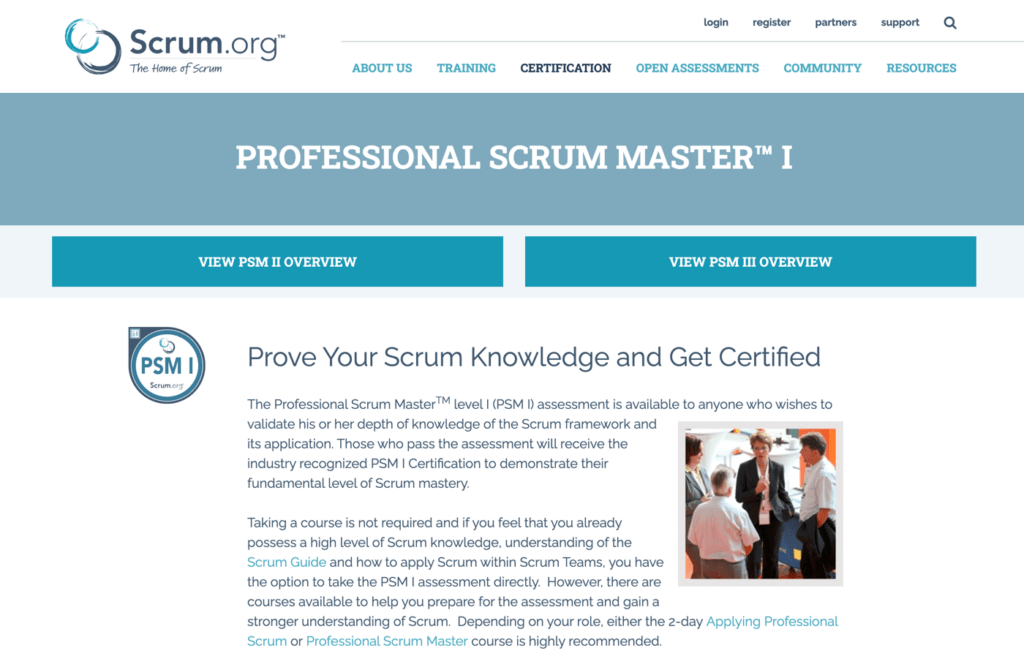With almost 10 years of successful PHP projects in Kambu, Ewa Zyzak is one of our most experienced Backend developers. In 2021, she took on the challenge of becoming a Scrum Master as well.
One year has passed, and she just passed the official Professional Scrum Master test, being awarded the title of Professional Scrum Master I. This moment inspired us to talk with her about her growing career.
As a Scrum Master, Ewa is responsible for upholding Scrum practices within Kambu. In practical terms, she helps projects run smoothly, removing all blocks so all stakeholders can focus on delivery.
Moving From Developer to Scrum Master
Being a Scrum Master is all about removing impediments big and small.
You started as a Scrum Master in Kambu after focusing on development for many years. How did you learn the Scrum methodology in the first place?
That came mostly from a lot of daily practice, seeing, project after project, what worked well and what didn’t. In Kambu we have always used Agile practices, so I can’t even remember times when I didn’t know a thing about Scrum!
And how is your work now?
I perform Scrum Mastering mostly on the backlogs and planning phases, but I’m also a developer. So I both plan and deliver.
It is challenging to be a Developer and Scrum Master in the same Scrum Team, as you have a double duty. You can’t overlook your developers to check if the team is self-organizing because you are one of them. For the same reason, you have to be active when there is some potential conflict between developers. Your lack of time can be an impediment for the team and how can you handle that kind of bottleneck? It is challenging sometimes.
The more I study Scrum, the more I see I would like to focus on being a Scrum Master in the future.
Why take a Scrum course now?
It’s 100% connected to my daily work, so it will be very useful. Plus, I received the certification at the end, which serves as another proof that Kambu is Agile-ready.
Can you talk a bit about the course? What did you enjoy the most?
A week before it started, we got access to an eLearning platform so we could learn alone and prepare for the workshops. But I think that a minority of participants had read it before.
The course then ran over three days via Zoom. Twenty more people participated, with very different levels of experience.

We were divided into four teams and had to work on the same issues. The course was very interesting and substantive.
The last day was the best when we practiced dividing big stories into smaller sizes. It was refreshing to have more practical exercises.
What specific benefits do you expect all this knowledge will have for our partners? And the rest of Kambu?
We can already see in practice that with good processes, our projects run more effectively. Agile practices allow us to deliver faster to our partners, with a shorter time to market.
And it’s better for coworkers too. The Scrum Master is the person who advocates, coaches and teaches Scrum. I can help everyone keep their focus on being more productive.
Our Agile has always had a strong core, and I think in Kambu we are on a good track to becoming even better.
Finally, what tips would you give to developers that think about becoming Scrum Masters?
Being a Scrum Master is all about removing impediments big and small. For example, clarifying with the Product Owner what is the scope of a sprint, rearranging backlog issues, or clearing up misunderstandings between the stakeholders and developers.
So you should ask yourself with sincerity: “How do I view daily work obstacles?” If you see obstacles as something to be worked on, chances are you will have a great time Scrum Mastering.
If, however, you see obstacles only as problems, that’s ok! But probably you will feel more gratification as a developer, focusing on implementation.
Finally, you must understand that Agile is a state of mind, so it should reflect on every action you take. Once you understand that, you will see all processes with different eyes.
Agile is a state of mind, so it should reflect on every action you take. Once you understand that, you will see all processes with different eyes.




